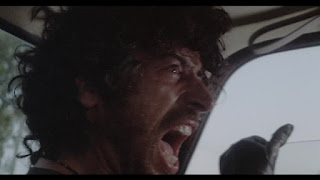“You're just crazy! Crazy and cruel!” Italy in
the 1970s was a turbulent place and time, rocked by socio-political change and
rife with organised crime. Drug cartels, kidnapping schemes, and young gangs
left the police scrabbling to catch up and the public locking themselves away.
Reacting to this period of fear, the film makers of the era unleashed a series
of hard-as-nails crime pictures and hard-bitten 'poliziotteschi' films.
Menacing rogue cops modelled on Dirty Harry dominated, but sometimes the
violent criminals took centre stage. One example would be Umberto Lenzi's Almost Human (1974), but not to be outdone – even in the twilight of his
career – Mario Bava (best known for horror films like Black Sunday or
Kill Baby Kill) dived into the fray with Rabid Dogs. However,
it was sucked into a nightmarish legal limbo before the low budget production
had even finished. The film, which many feared to be lost forever, remained
unseen for more than twenty years before, at long last, it was pulled from the
ashes and given new life...
Click “READ MORE” below to continue the review and see more
screenshots…
“One step closer and I'll kill her!” Based on
Michael J Carroll's short story 'Man and Boy', Bava's foray into the crime
thriller genre comes on as a brisk and unshackled rebel yell; his work in the
early 70s, much like the nation, was taking some serious knocks. 1970 had seen
the troubled inception of Five Dolls For An August Moon (Bava was a
late hire and not afforded time to re-write the script to his liking), but
1971 saw the mischievous film-maker's talent better served with A Bay of
Blood. His creative endeavours continued to sway in the subsequent two
years though, with 1972's Baron Blood proving to be an awkwardly
backwards-looking combination of the old and new (exemplified by a Coke
machine housed inside a crumbling old castle), while the wild and weird Lisa
and The Devil (1973) ran into a series of issues.
“They're shooting at us like we're pigeons.”
All-the-more impressive then that, in the twilight of his career (he died in
1980), Mario Bava was able to challenge the young upstarts with a real-time
thriller populated by blood thirsty thieves and killers. Shorn of the
hyper-stylised lighting schemes and compositions of his horror pictures, the
more comic book tones of Danger: Diabolik (1968), or the
exquisite glamour of his gialli, Rabid Dogs is strikingly modern and
visceral. Further stripped of controlled sets and haunting night-time staging,
here Bava – much like his cast of characters – is exposed to the bright,
sweltering summer sunshine.
“Would you kill children to save your own skin?”
Friday. 11:30am. The payroll for a pharmaceutical company's employees is being
delivered by car. In rolls a pokey Fiat 500 – followed by another car, which
grinds to a halt and expels a gang of gun-toting, mask-wearing thieves. They
hit hard and fast – killing the company's treasurer in the process – and flee
with the cops hot on their heels! Scored by Stelvio Cipriani (What Have They Done To Your Daughters?), it makes for a pulse-pounding,
teeth-gnashing, window-shattering opener. However, with their fuel tank leaking
and their getaway driver dead, Doc (Maurice Poli, Five Dolls For An August Moon), Blade (Aldo Caponi, aka Don Backy), and Thirty-two
(George Eastman, aka Luigi Montefiori, Anthropophagus) escape
into the concrete jungle of an underground parking structure. Here, in a
fraught stand off with police, they kill one woman and kidnap another – Maria (Lea
Lander, Blood and Black Lace) – and hijack a new ride, gathering
themselves two more hostages: Riccardo (Riccardo Cucciolla) and his
ailing young son Agostino.
“You'd be surprised how long people keep fighting after
they've been stabbed.” With the cops off their backs they leave the
city behind and head into the countryside, slipping free of the police
roadblocks – and so begins a sweat-soaked sprint into danger. Like some bizarre
family out for a drive, tensions inevitably escalate. Riccardo is the
hen-pecked mother, insular and solely concerned with the fate of his son. Doc
is the quiet and tactical disciplinarian father (and the brains of the
criminal gang). Meanwhile, Thirty-two is child number one: a brutish and
overgrown school bully, and Blades is child number two: the psychotic,
switchblade-wielding sidekick. Stuck between it all – and the object of
Thirty-two's increasingly threatening leers – is Maria, shot-through with fear.
As their taut journey continues – the scorching summer heat utterly palpable
within the humid confines of the car (focus of much of the film's running
time) – things start getting out of hand. Can the hostages get free of the
criminal gang, and even if they do, will they manage to walk away unsullied by
the experience?
“Human skin's a completely different story – it peels
off just like a banana.” While the claustrophobic space of the car, and
the real-time approach, can at times draw things out, the film is constantly in
motion with a few fingernail-bothering set pieces layered in-between. An
attempted escape leads to an unflinching scene of humiliation (Wes Craven's Last
House on the Left – 1972 – might very well have inspired screenwriters
Alessandro Parenzo and Cesare Frugoni), while further detours engender a
stifling sense of paranoia as the yearning for escape becomes desperate and the
mania of violence begets a 'nothing left to lose' attitude. When the stakes are
this high, who would need a shot of espresso to keep them wide-eyed and on the
edge of their seat?
“I can't take this any more! You're disgusting! You're
pigs!” In the words of Bava's son Lamberto (who worked on the film
as Assistant Director), Rabid Dogs is “bitter … taking cynicism to
the maximum level”, producing a tone that is tough, bleak, and laced with
razor-toothed wit. The director encourages his viewer to simultaneously be the
victim and the tormentor – we suffer with Riccardo, and particularly Maria –
while a vulgar, motor-mouthed, self-obsessed hitch-hiker gets us rooting for
the thugs to snuff her out and toss her in a ditch pronto. This jagged schism
underpins the film's vicious tone, which is nothing short of energetic and
feverishly vibrant. Far from pretty, the events are captured by Bava – who took
over cinematography duties from Ennio Varriano for budgetary reasons – in an
array of meticulously framed wide angle views inside the cramped car. He
captures every seething glance, every twitch of a trigger-happy finger, and
every rolling bead of sweat.
“Guys, there's loads of cash here – we're rich!”
Arrow Video's 2014 three-disc Blu-Ray/DVD release of Rabid Dogs also
includes the alternative cut of the film – Kidnapped – which features
additional scenes (shot by Lamberto Bava), a new score, new sound, and
with different editing choices. However, considering that it's usually best to
watch the version intended by the director, Rabid Dogs wins out –
indeed, even just for Stelvio Cipriani's never-shredding score alone, it is the
superior incarnation of the film. Presented in 1.85:1 widescreen with the
original mono audio (Italian language with optional English subtitles),
the movie boasts a generally high quality HD restoration. That said, taking
into account the film's troubled inception – and decades lost on storage room
shelves – missing elements lead to the employment of disparate sources with
varyiable quality. At numerous points in the film – but mostly in the early
stages – the picture quality flips back and forth between High and Standard
Definition sources, the latter being used to plug various gaps. The
changeability is noticeable, but Arrow have sought to match them as best they
can – and frankly it's astonishing that they were able to actually complete
this project. Arrow, Lamberto Bava, and Alfredo Leone – but chief amongst them
all, the film's star Lea Lander – should be commended for their work in
bringing about this release.
The entire and complex tale of the film's rescue is detailed
in an excellent booklet (which also features the original 'Man and Boy'
short story) included inside the case, and in a 2007 featurette ported over
from a previous Anchor Bay release. Also included is an audio commentary from
Bava biographer Tim Lucas, and an interview with Umberto Lenzi, which provides
brief but fascinating background on the state of organised crime in Italy
during the 1970s. This isn't a features-packed and flawless release, but its
existence in itself is remarkable and clearly much effort and attention to
detail has been spent.
“I should have known that someone like you can't be
trusted.” Bolstered by a uniformly on-top-of-their-game cast (Lander
in particular), this late entry for Mario Bava could have been a
revitalisation of his career if the cruel hand of fate (and the legal
troubles of a bankrupted production company) had not intervened. It made
for an ignominious, long-winded delay for what is a superb crime thriller, but
even with a release far behind its creation, Rabid Dogs is entirely
capable of standing beside present day thrillers. Consider this a highly
recommended viewing experience – a once-lost gem given the resurrection it
deserves.
N.B. Screenshots are taken from the DVD copy of Rabid Dogs.
N.B. Screenshots are taken from the DVD copy of Rabid Dogs.

























No comments:
Post a Comment